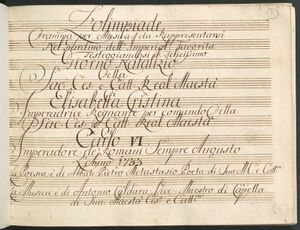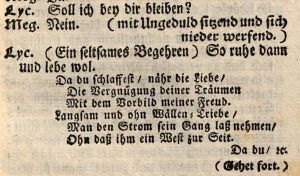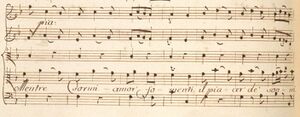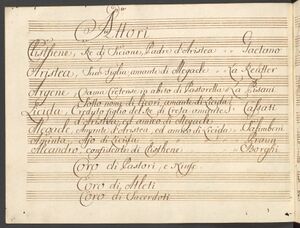Mentre dormi amor fomenti (Antonio Caldara)
| L'olimpiade | |
|---|---|
| opera seria by Antonio Caldara | |
 Title page of the manuscript, 1733, Vienna [1] | |
| Translation | dt.: Olympisches Jahrfest |
| Librettist | Pietro Metastasio |
| Language | Italian |
| Premiere | August 30, 1733 Wien |
"Mentre dormi amor fomenti" is an aria sung by the character Licidas (Italian: Licida)(German: Lycidas (1733)) in Antonio Caldara's L'olimpiade (Caldara). The libretto was created by Pietro Metastasio; Caldara's opera was the first time that L'olimpiade was set to music.
The booklet [2] states that the Role of Licidas was sung by the famous castrato Gaetano Orsini. However, the title page of the score in Vienna has Gaetano (Orsini) as King Clisthenes and (Pietro?) Cassati as Licidas.[1] This could not be immediately corroborated and would merit additional research.
"Lo seguitai felice" appears on the following album:
| Year | Album | Ensemble | Conductor |
|---|---|---|---|
| 2013 | Caldara in Vienna (Album) | Concerto Köln | Emmanuelle Haïm |
Libretto
from L'olimpiade
Antonio Caldara (music), Pietro Metastasio (words)
(Strana voglia!) E ben riposa. Addio. | |
What can this mean! [aside] | |
(Ein seltsames Begehren) | |
(Welch ein seltsamer Entschluß!) | |

Context
The Aria appears in ACT I, Scene VIII of Caldara's L'Olimpiade.
Manuscripts and sheet music

- Deutsches Libretto 1:
- Olympisches Jahr-Fest. Welsch-gesungener vorgestellet. Von Antonio Caldara in Music verfasset
- Verlag: Ghelen
- Österreichische Nationalbibliothek
- 1733
- Olympisches Jahr-Fest. Welsch-gesungener vorgestellet. Von Antonio Caldara in Music verfasset. Vienna: Gehlen, 1733.[5]
- Deutsches Libretto 2:
- Das olympische Jahrsfest, ein Singspiel, vorgestellet auf der privilegirten Schaubühne nächst der kaiserl. Burg im Jahr 1764. In das Deutsche übertragen von J. A. E. v. G.
- Verlag: Ghelen
- Österreichische Nationalbibliothek
- 1764
- Das olympische Jahrsfest, ein Singspiel, vorgestellet auf der privilegirten Schaubühne nächst der kaiserl. Burg im Jahr 1764. In das Deutsche übertragen von J. A. E. v. G. Vienna: Gehlen, 1764.[6]
- Italian Libretto:
- "L'olimpiade, Vienna, van Ghelen, 1733". Progetto Metastasio. Retrieved October 1, 2023.[3]
- Score:
- Copyist Copyist of Vienna
- Publisher Info. Manuscript, n.d.(ca.1733).
- Misc. Notes Österreichische Nationalbibliothek, Vienna (A-Wn): Mus.Hs.17164
- Contains ballets composed by Nicola Matteis Jr..
- Work Title L'olimpiade
- Composer Caldara, Antonio
- I-Catalogue Number IAC 161
- Movements/Sections 3 acts
- Year/Date of Composition 1733
- First Performance 1733-08-30 in Vienna, Teatro della Favorita
- Librettist Pietro Metastasio (1698-1782)
- Language Italian
- Composer Time Period Baroque
- Piece Style Baroque
- Instrumentation 7 vocal soloists, mixed chorus (SATB), orchestra[1]
References
- ↑ 1.0 1.1 1.2 1.3 L'olimpiade (Caldara, Antonio). Vienna: Manuscript, 1733.
- ↑ "Booklet Caldara in Vienna" (PDF). Idagio. Archived (PDF) from the original on October 1, 2023. Retrieved October 1, 2023.
- ↑ 3.0 3.1 "Progetto Metastasio". Landing Page. Retrieved October 1, 2023.
- ↑ Hoole, John (1800). Dramas and other poems of the Abbé Pietro Metastasio. Translated from the Italian by John Hoole Vol. I. Stanford University: Otridge and Son, London.
- ↑ 5.0 5.1 5.2 Olympisches Jahr-Fest. Welsch-gesungener vorgestellet. Von Antonio Caldara in Music verfasset. Vienna: Ghelen, Österreichische Nationalbibliothek. 1733.
- ↑ 6.0 6.1 Das olympische Jahrsfest, ein Singspiel, vorgestellet auf der privilegirten Schaubühne nächst der kaiserl. Burg im Jahr 1764. In das Deutsche übertragen von J. A. E. v. G. Vienna: Gehlen, 1764.
External links
- "Booklet Caldara in Vienna" (PDF). Idagio. Archived (PDF) from the original on October 1, 2023. Retrieved October 1, 2023.
- "Progetto Metastasio". Landing Page. Retrieved October 1, 2023.
- "L'olimpiade (Metastasio)". Wikiwand. Archived from the original on October 1, 2023. Retrieved October 1, 2023.
- "Pietro Casati". Quell'usignolo. Archived from the original on October 1, 2023. Retrieved October 1, 2023.
